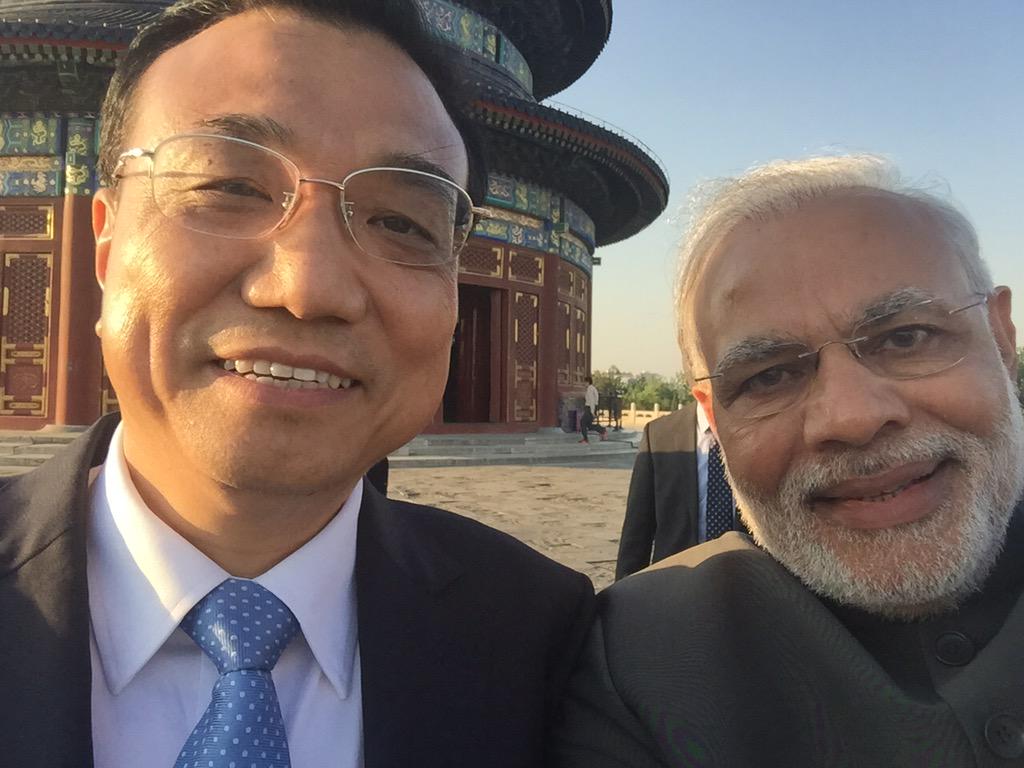The China pitstop has perhaps been the most interesting in our globe trotting PM’s itinerary. The beginning wasn’t as exciting for its substance as it was for its selfie opportunities, and even though a couple dozen government to government MOUs were announced, it is hard to get excited about an agreement between Doordarshan and China Central Television Corporation or even a yoga college in China.
The primary criticism I saw of these MOUs was that these were nothing more than a framework to do something sometime in the future, and most of them don’t translate into anything tangible, and it does seem that this criticism is fair.
Another criticism has been the lack of progress made on difficult issues like border disputes, China flexing its muscle in the Indian Ocean, stapling visas on residents of Arunachal Pradesh, building roads in POK and I believe nothing revealed in public gives any reason to think that China is rethinking any of its moves in those directions.

Finally, the issue of India’s increasing trade deficit with China which is to the tune of $38 billion dollars last year was also brought up but this is one area where I think talks are not going to help much. The trade deficit exists because there is an imbalance in the manufacturing capabilities of the two countries, and China is much better at manufacturing than India, and as long as that remains true there will be an imbalance. This is a problem whose solution lies inwards, not external.
There was however one tangible piece of action, and that was with the announcement of the commercial contracts which are estimated to be around $22 billion and are to be executed between Indian and Chinese companies.
They have substance, and the list of the MOUs shows that they include varied companies and sectors, and I feel that this is a very good outcome for the visit.
The most interesting aspect of this investment is that it is of a somewhat equal nature unlike most other big announcements that come out of China.
I say equal to mean that this is not simply the case of Chinese companies building infrastructure in a foreign country which is usually how these things are but rather a mix of investments from Indian companies in China like Wipro or Infosys, investments from Chinese companies in India in partnership with Indian companies like the solar power co-operation between Welspun and Trina Solar, and financing deals like the one Bharti got from China Development Bank.
Contrast this to the $46 billion investment that China pledged to Pakistan recently to build infrastructure in that country, or the $50 billion China recently announced to spend in Brazil and the difference is clear.
To take the Brazilian example, look at this excerpt from the BBC article about this.
China is planning to invest up to $50bn (£32bn) in Brazil for new infrastructure projects.
The deal is due to be signed by banks from both countries during a visit by Chinese Prime Minister Li Keqiang to Brazil next week.
The money will go towards building a railway link from Brazil’s Atlantic coast to the Pacific coast of Peru to reduce the cost of exports to China.
I believe the deals that Indian companies have signed are a positive outcome, and should translate into meaningful progress in the next few years. The scale is big enough to make a difference, and the nature of these transactions are such that they keep India on an equal footing with China with respect to these deals.

I happy join I t l
Another concern I want to add is no country wants to help his neighbour anticipating that he will be competing with him in future.
“The most interesting aspect of this investment is that it is of a somewhat equal nature”- interesting observation. I thing India sees China as equal and is cautious about security to allow it to build infra projects here.
There was a cover story in India Today “Dancing with the dragon” – I had a mixed feeling to read that Wipro consumer goods and Mahindra tractors were being manufactured in China. It is good because like rich Western MNCs, Indian companies are also outsourcing manufacturing there. But sad because these could have created much needed jobs in India. Your thoughts?
I think it is great that Indian companies set up manufacturing in China, there is no losing side here. Either companies produce in China and gain advantage in terms of cost and scale or they lose to other players who have that advantage. You only have to look at the appliances in your house or the car you drive to see what I mean. Most of them are Korean, American or Japanese companies with a strong manufacturing presence in China.
Till the time China has an edge in terms of infrastructure and ease of doing business – money will flow there and rightly so. We in India should be thankful for this because if this weren’t the case our services sector wouldn’t have grown the way it has.
At the same time there needs to be a push to develop infrastructure and policy regime to make it easier to do business in India. There is no incentive for Indian companies to do business in China or elsewhere if they can get the same conditions in India, which are sadly and painfully absent here.